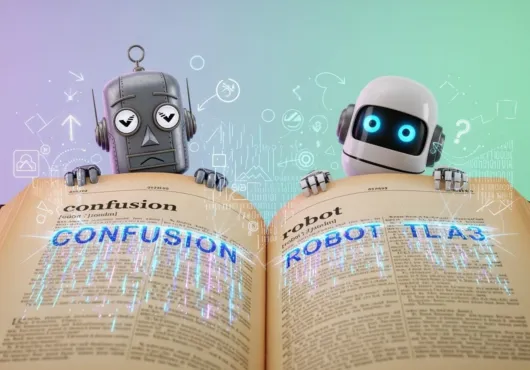“Know the difference between adding knowledge and changing behavior—or enjoy paying compute to cosplay certainty.”
You don’t need a custom brain to answer, “What’s in our handbook?” You need a model that can look stuff up without lying. But every week someone straps a model to a GPU rack because their PDF wouldn’t paste. That’s not engineering. That’s theater.
Changing facts? RAG.
Changing behavior? Fine-tune.
Want both truth and discipline? Hybrid: RAG for knowledge, a small tune for habits.
Cold open: The meeting where everyone nods at the wrong solution
Your team asks for “a model that knows our product.” Translation: there’s a pile of docs no one reads. The PM says “fine-tune it.” The data lead mutters something about embeddings. The exec wants “magic that works offline.” And now you’re arguing about LoRA adapters like the problem wasn’t a search query with receipts.
Here’s how to stop wasting quarters: answer these three questions.
The three-question test (answer honestly, save money)
1) Does the truth change weekly?
If the facts shift—prices, policies, SKUs, versions—RAG wins. Retrieval lets you swap the source without retraining. Fine-tuning bakes yesterday’s truth into weights and then invoices you to un-bake it later.
What this proves: You need fresh knowledge access, not personality surgery.
What this can’t prove: That your sources aren’t garbage. If the index is wrong, RAG just finds the wrong thing faster.
2) Do you need the model to behave differently, not just know more?
Tone, format discipline, domain-specific reasoning patterns, multi-step rituals—this is behavior. If you want terse citations, structured JSON every time, fewer hedges, or a house style that sticks under pressure, fine-tuning (or a small adapter) is the right lever. RAG won’t make a chatty model concise; it will just hand the chatter more to chatter about.
What this proves: You’re buying a habit, not a library card.
What this can’t prove: That your prompts aren’t already doing 80% of the job. Try system-prompt + examples before you torch a budget.
3) Are high-quality labels cheap for you?
If you can produce hundreds/thousands of clean input→output pairs that represent the exact behavior you want—great, tune. If not, RAG plus a tight prompt contract gets you most of the way with near-zero labeling pain.
What this proves: You’re ready to teach; you have a curriculum.
What this can’t prove: That you won’t drift. If your process changes monthly, your fine-tune becomes a museum exhibit.
When each tool actually wins (no mysticism required)
RAG (Retrieval-Augmented Generation) is for knowledge volatility and provenance. You give the model a short memory shuttle packed with the precise chunks it needs right now, with citations. You can rotate sources, version them, and show your work. It scales with docs, not with drama.
Fine-tuning is for style, discipline, and domain-shaped cognition. You alter how the model speaks, formats, and prioritizes under load. Do it when you need the same behavior at 3 a.m. on a Tuesday with no babysitting.
Hybrid is normal. Add RAG for truth, add a small adapter or instruction-tune for reliability (format, tone, refusals). You don’t pick a religion; you pick a stack.
The receipts run (kitchen-table version)
No GPUs with attitude required. Prove it in an afternoon.
Build a tiny truth set (50–100 Q&A). Ground truth lives in your docs.
RAG-only pass. Basic chunking, top-k retrieve (start with k=5), inline citations. Measure: exact-match accuracy, citation coverage, and time to update when a source changes.
Fine-tune-only pass. Same questions, no retrieval. Measure: accuracy today, how wrong after you update a source (the decay).
Hybrid pass. Small adapter for output discipline + the same RAG. Measure: accuracy, refusal rate when sources are missing, and JSON validity if you care about structure.
If RAG beats fine-tune on freshness and provenance (it will), and hybrid beats both on reliability, you’ve got your architecture. If not, enjoy the humble pie; at least you measured.
Falsifier: I’m wrong if a fine-tuned, no-RAG model stays within 2% of RAG’s accuracy after you swap a core fact in the source—and does it without hallucinated citations.
Costs they never put in the slide
Maintenance gravity: Every fine-tune creates a versioning problem. People forget which model knows which policy. RAG centralizes truth in the index.
Latency: RAG adds a retrieval hop; fine-tune adds nothing at runtime. Counteract with caching and smaller contexts.
Risk: RAG failure is usually “no doc found.” Fine-tune failure is confident fiction. Decide which you’d rather debug at midnight.
Ship pattern (works, boring, that’s good)
Start with prompt contract (role, scope, refusal rules) + RAG (citations mandatory).
Add format guard (JSON schema / function calls).
If the model still freelances tone or structure, add a small adapter (LoRA) with 500–2,000 gold examples.
Stamp the outputs (hash), log the sources, and wire a kill-switch. When facts change, you update the corpus, not the weights.
If you’re arguing RAG vs. fine-tuning, you’re already in the wrong meeting. The question is: do you need fresher truth or fewer instructions? Pick the one that kills the bigger pain today, then add the other when you hit its limits. Tools don’t win—systems do. The system that marries fresh context with trained instincts wins quietly, every time.


